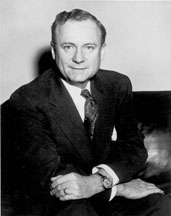
Born Marion Price Daniel, Sr., in October 1910, he was the son of a rancher. He was born just outside the small Southeast Texas community of Dayton and was the oldest of three children. He was a conscientious, hard-working student. As a teenager, he moved briefly to Fort Worth, where he graduated high school.
After high school, he enrolled at Baylor University in Waco. To help pay for college, he worked as a reporter for the former Waco News-Tribune for a time. He graduated with a law degree in 1932 and returned to Liberty County to practice law.
He quickly became a respected attorney in the area and won fame in a series of high-profile local cases. He also briefly ran a local newspaper. In 1938, he was elected to the State House of Representatives as a Democrat. He served on the Judiciary Committee as well as the Oil, Gas, and Mining Committee and supported the oil and gas industry. Proposals for a state sales tax emerged, and Daniel became part of a group known as the “Immortal 56” in his outspoken opposition to it. Respected by his colleagues for his energy and integrity, he was elected Speaker of the House for the 1943 session.
The session took place in the midst of World War II. Though still the Speaker of the House, Daniel decided to serve his country in a new way and enlisted in the army at the end of the session in May 1943. He started as a private but was sent to train as an officer and became a lieutenant in the judge advocate general’s office. He served mostly in the Pacific and was honorably discharged as a captain in May 1946.
Immediately upon his discharge, he ran for state attorney general for the July primary. Using his fame from his war record and speakership, he won easily. He worked to defeat organized gambling in the state. His office filed more than 5,000 lawsuits while he worked on dozens of committees and recommended hundreds of pieces of legislation to the state legislature. However, two cases in particular stood out in his time as attorney general.
In 1947, an African-American post office employee, Heman Sweatt, applied for admission to the University of Texas Law School. Similarly to cases erupting across the South, though Sweatt was qualified for admission, segregation kept him from attending because of skin color. As attorney general, Daniel had to defend the laws of the state at the time and took the case all the way to the Supreme Court. The Supreme Court ruled in 1950 that Sweatt deserved an equal education, and as a result was ordered enrolled in the law school.
The Tidelands Controversy became another explosive issue. In the late 1940s, Texas was trying to enforce its mineral rights in the Gulf of Mexico. Federal law claimed that the state had no jurisdiction in those areas and that any oil leases belonged to the federal government. Being an oil-rich state, the Texas public took a strong interest in the case. Daniel argued that Texas had an 11-mile claim dating to its time as an independent republic. This sparked a sharp controversy with President Harry S. Truman and his belief that federal law superseded any claim Texas might have had. The Supreme Court agreed.
As a result of the court fight, in 1952, Daniel refused to back the Democratic presidential nominee, Gov. Adlai Stevenson of Illinois, in favor of the Republican nominee, Texas native Gen. Dwight D. Eisenhower. Daniel also announced his run for the U. S. Senate that year to replace the retiring Sen. Tom Connally. He ran as a “Texas Democrat” in defiance of the Truman administration’s stands on the Tidelands issue. Daniel won easily, as did Eisenhower. In 1953, Eisenhower signed a bill sponsored by Daniel to recognize the Texas claim on the 11-mile limit. The result was that Texas was able to claim hundreds of millions of dollars in the coming years.
Price Daniel had risen rapidly in a short time. Now a U. S. Senator, his prospects seemed limitless. And in so many ways, his career was only beginning.

